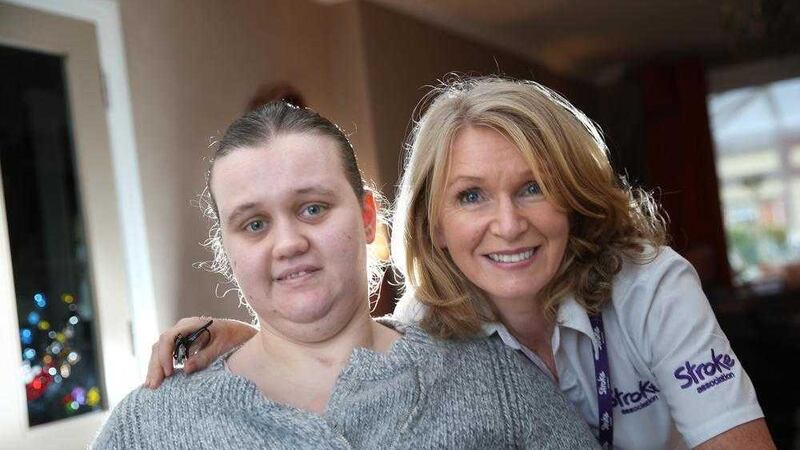ON the eve of sitting her final degree exams, Leah Batchelor was busy doing a charity bag pack in a supermarket when she suffered a stroke so rare it affects one in 10 million people.
Within hours the 21-year-old Dundonald woman was on an a life support machine in the Royal Victoria hospital in Belfast, with her family informed her chances of survival were slim.
As surgeons prepared to operate on what they thought was a brain tumour, a sudden intercession from specialist consultants in Liverpool led them to discover it was a massive burst aneurysm - and that any operation would kill her.
It emerged Leah had experienced such an extreme brain stem stroke it resulted in her developing a devastating condition that paralysed her entire body - yet left her conscious and being aware of everything around her.
The prognosis of 'locked-in syndrome' was grim - the only muscle she could move was her eyelids and doctors warned the previously happy-go-lucky student may never be able to walk, talk, eat or breathe again unaided.
She was trapped inside her own body.
Leah communicated through blinking and gave her permission to have her life support turned off in the event of suffering another stroke.
Her heartbroken mother Allison also gave permission not to resuscitate.
Four years on, she is sitting in a specially adapted wheelchair in the family home and looking forward to graduating with a 2:1 honours degree in graphic design from Ulster University next week.
Following a five-hour intricate operation in January last year to rebuild her palatte she has taught herself to speak again over the past 12 months.
The Girls Brigade chief has also just undergone an intensive fortnight's rehabilitation in a London clinic where she took "small steps" while aided.
"What I am really determined to do is to walk across that graduation stage next week with my mum by side and collect my degree certificate. I don't want to be in a wheelchair," she told the Irish News.
The Co Down woman's progress and determination has confounded the medical world, with doctors admitting her abilities far exceed what her MRI scans show.
Reflecting on her lowest point in hospital, Leah admits that she didn't feel she could go on.
"I was completely aware of what was happening as my mind was so active but I couldn't move, speak or swallow. It was like being alive in a dead body," she said.
"People were asking questions - I kept my eyes open for 'no' and blinked for 'yes'. But they weren’t the questions I wanted answered. My faith is strong and I talked to God and asked him to let me die or for a sign that I should go on."
Leah concentrated so hard on trying to move a muscle that at one point the blood vessels in her eyeballs burst from straining.
Her condition would not allow the signals to go from the brain to the body.
After seven weeks, there was a tiny movement in the little finger on her left hand. She was no longer locked-in - and doctors could not explain it.
Within a fortnight she was moved to the specialist stroke rehabilitation ward at Musgrave Park hospital, where one experienced consultant admitted to her father Tom he was moved to tears by her sheer will to recover.
Leah would spend the next seven months in the Belfast hospital, where she was fed through a tube into her stomach.
Her only brother Ryan, who is five years older, remained by her bedside throughout the traumatic period and even spent many nights sleeping in hospital. He is now his sister's main carer.
Following her discharge from hospital Leah was determined to finish her studies. She retrained her left hand to work (she is right-handed but has limited movement on that side of her body) and went back to college where she completed her studies part-time.
Throughout her recovery, Leah has received one-on-one support from the Stroke Association NI and built a strong bond with care worker, Carmel Lavery.
Carmel said Leah has become an "inspiration" for stroke patients.
"Leah is an ambassador for stroke survivors. She is a role model and and inspires others to realise that anything is possible with determination and hard work."
*The Stroke Association is inviting nominations for its 2016 Life After Stroke Awards, of which Leah is a recipient. Nominations can include stroke survivors, carers, volunteers, fundraisers or someone in a professional role. Nomination forms are available at: www.stroke.org.uk/nilasa or call 028 9050 8020. Emailni-lasa@stroke.org.uk to request a nomination form. The deadline is 5 February 2016.






